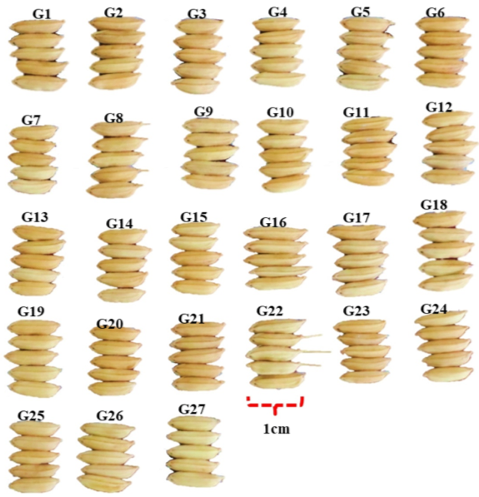VOLUME 13 NUMBER 1 (January to June 2020)

Philipp. Sci. Lett. 2020 13 (1) 6-12
available online: February 29, 2020
*Corresponding author
Email Address: aldrincantila@gmail.com
Date received: March 14, 2019
Date revised: December 30, 2019
Date accepted: February 13, 2020
ARTICLE
Additive main effect and multiplicative interaction (AMMI) stability analysis for grain yield of 27 rice genotypes tested in six environments
by Aldrin Y. Cantila*1,2, Sailila E. Abdula1, Jenalyn B. Imbat3, and Alvin John R. Quitel4
1Philippine Rice Research Institute,
Midsayap Experimental Station, North Cotabato, Philippines 2School of Biological Sciences, The University of Western Australia
Perth, WA Australia
3PhilRice Field Office, CMU Campus
Maramag, Bukidnon, Philippines
1Southeast Asia Regional Initiative for Community Empowerment,
Diliman, Quezon City, Philippines
Midsayap Experimental Station, North Cotabato, Philippines 2School of Biological Sciences, The University of Western Australia
Perth, WA Australia
3PhilRice Field Office, CMU Campus
Maramag, Bukidnon, Philippines
1Southeast Asia Regional Initiative for Community Empowerment,
Diliman, Quezon City, Philippines
Identification of rice genotypes with high stability and yield is an important aspect to the varietal recommendation of the national cooperative testing (NCT). Twenty-three rice genotypes (selection after seven generations), and the four check varieties were evaluated in grain yield (GY) to six environments. Additive main effects and multiplicative interaction (AMMI) found high significance in genotype (G), environment (E) and G by E interaction effects and in the first four interaction principal component analysis. Three public-derived genotypes: M19-250GY.3-1-2-3-4-5 (G4), M19-300GY.9-1-2-3-4-5 (G14) and M19-250GY.6-1-2-3-4 (G8), and two private-derived genotypes: Priv2-250GY.2-1-2-3-4 (G20) and Priv3-300GY.1-1-2-3-4-5 (G23) were the most stable genotypes. M19-250GY.1-1-2-3-4-5 (G2), M19-250GY.4-1-2-3-4 (G5) and M19-250GY.6-1-2-3-4-5 (G9), and two check varieties: NSIC Rc262 (G24) and NSIC Rc132 (G26) had the highest in GY. Stable genotypes can be a good gene source to breeding programs targeting rice with wider phenotypic adaptability while high yielding genotypes can be submitted for NCT. Overall, AMMI is useful in determining important variations and highly adaptable genotypes in different environments.
© 2024 SciEnggJ
Philippine-American Academy of Science and Engineering